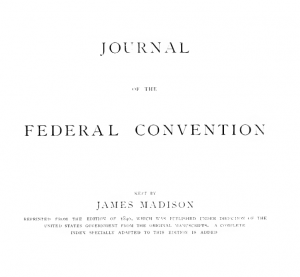June 22, 1787 (click link for Madison’s notes)
Summary
Today in Convention was all about the legislature. The delegates affirmed 25 as the minimum age for a representative. On the negative, the delegates defeated a motion to allow the House to set pay for members and a motion to take their pay from the National Treasury.
Influences on the Delegates
On the matter of the minimum age for members, the delegates debated mostly on their own experience. However, Jame Wilson pointed to two young men who made important contributions as a reason not to have a minimum age for service.
Mr. WILSON was against abridging the rights of election in any shape. It was the same thing whether this were done by disqualifying the objects of choice, or the persons choosing. The motion tended to damp the efforts of genius and of laudable ambition. There was no more reason for incapacitating youth than age, where the requisite qualifications were found. Many instances might be mentioned of signal services, rendered in high stations, to the public, before the age of twenty-five. The present Mr. Pitt and Lord Bolingbroke were striking instances.
Notice no one referred to the Bible when in fact there is Scripture about not laying hands on a novice.
On the matter of holding more than one office, SC’s Pierce Butler looked to Great Britain as a negative model.
Mr. GORHAM moved to strike out the last member of the third Resolution, concerning ineligibility of members of the first branch to office during the term of their membership, and for one year after. He considered it unnecessary and injurious. It was true, abuses had been displayed in Great Britain; but no one could say how far they might have contributed to preserve the due influence of the Government, nor what might have ensued in case the contrary theory had been tried.
Mr. BUTLER opposed it. This precaution against intrigue was necessary. He appealed to the example of Great Britain; where men get into Parliament that they might get offices for themselves or their friends. This was the source of the corruption that ruined their government.
Mason agreed:
Colonel MASON was for shutting the door at all events against corruption. He enlarged on the venality and abuses, in this particular, in Great Britain; and alluded to the multiplicity of foreign embassies by Congress. The disqualification he regarded as a corner-stone in the fabric.
Hamilton agreed with Gorham that holding more than one office was the cause of corruption. He favored striking the ineligibility clause.
Colonel HAMILTON. There are inconveniences on both sides. We must take man as we find him; and if we expect him to serve the public, must interest his passions in doing so. A reliance on pure patriotism had been the source of many of our errors. He thought the remark of Mr. GORHAM a just one. It was impossible to say what would be the effect in Great Britain of such a reform as had been urged. It was known that one of the ablest politicians (Mr. Hume) had pronounced all that influence on the side of the Crown, which went under the name of corruption, an essential part of the weight which maintained the equilibrium of the Constitution.
On Mr. GORHAM’S motion for striking out “ineligibility,” it was lost by an equal division of the votes, — Massachusetts, New Jersey, North Carolina, Georgia, aye — 4; Connecticut, Maryland, Virginia, South Carolina, no — 4; New York, Pennsylvania, Delaware, divided.
For the time being, the delegates deadlocked on the matter.

